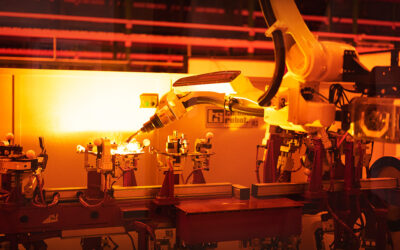The fifth annual State of the Motoring Industry event took place recently at the Kyalami Grand Prix Circuit and International Convention Centre. Toyota South Africa president and CEO, Andrew Kirby, delivered his address on the current affairs affecting Toyota and the broader automotive industry in South Africa.
Some of the noteworthy topics discussed include the future of mobility, market trends and forecasts, as well as announcements about various motorsport events in South Africa, including the upcoming Formula E race in Cape Town. The guest speaker at this year’s event was the chief scientist at Toyota Motor Corporation and CEO of the Toyota Research Institute, Dr Gill Pratt.
He outlined Toyota’s global plans for electrification and reduction of carbon emissions, as well as their plans for autonomous driving vehicles in the near future. Toyota is a long-standing indirect customer of Formex Industries. Many of the automotive components and assemblies that we manufacture are used on Toyota vehicles.

Toyota South Africa CEO Andrew Kirby
Carbon emissions: major topic at State of the Motoring Industry
One of the key highlights from the State of the Motoring Industry address was decarbonisation and the strategies that will make this a widespread reality very soon. “We believe in battery electric vehicles and we’re investing heavily in them, but we also believe that the way to reduce more carbon emissions sooner is to employ diverse solutions,” explained Dr Pratt.
“This is particularly important for mitigating climate change because CO2 emissions accumulate globally and remain in the atmosphere for a long time. We need to reduce CO2 as much as possible, as soon as possible,” he added. Dr Pratt outlined the three key strategies for reducing carbon emissions, which can be applied to all manufacturing companies:
- Decarbonise production processes as much as possible.
- Enable employees and customers to reduce their CO2 emissions too.
- Maximise Carbon Return on Investment (CROI).
These three steps will enable car brands to effect positive change on the environment, not just through their manufacturing processes, but also through the ongoing use of their vehicles by customers.

Diversification and adoption of EVs
Another insight delivered by Dr Pratt was Toyota’s diversification strategy that will allow them to produce more electric vehicles (EVs). This should also be a core pillar of any automotive brand’s growth strategy. “The greatest reason Toyota believes we should diversify our portfolio of solutions to climate change is that a diverse approach is more likely to work,” said Dr Pratt.
“That’s why in December of 2021 Akio Toyoda announced that Toyota will invest approximately $70-billion globally in electrified vehicles, including hybrid-petrol vehicles, plug-in hybrid electric vehicles, fuel cell electric vehicles and battery electric vehicles (BEV),” he explained.
This will allow Toyota and other brands with similar strategies to prepare for as many market opportunities as possible. It will enable car manufacturers to cater to wider markets and the needs of various populations across the globe. Toyota is planning to launch 30 new BEVs by 2030 and Lexus, its subsidiary luxury brand, is aiming for 100% electric sales by 2035.

Car brands need to empower customers
Adopting a diversified approach to electrification should be on the agenda for all automotive manufacturers. Car brands should empower their consumers to tackle climate change and reduce their carbon footprints through sustainable vehicle options. “We want to give all people around the world, from all walks of life, the best tools to solve the global problem of climate change,” said Dr Pratt.
“Different people have different circumstances and different needs. Some live in areas with electrical grids powered by renewables, others live in areas that will be powered by fossil fuels for some time. Some have convenient charging stations at home and others live in cities where that is more difficult.”
“Some are wealthy. Most are not. As a result, what is best for the average person or for any particular person is not best for every person. We need to supply the world with a diversity of tools…Toyota believes the best strategy today for reducing greenhouse gases is to offer a diverse portfolio of hybrid vehicles, plug-in hybrid vehicles, battery electric vehicles and fuel cell vehicles,” he stated.
This is an achievable goal that can be adopted by all vehicle manufacturers for the good of the planet. It will help consumers to make conscious choices about their carbon footprints and enable them to choose between various eco-friendly alternatives to fossil fuels. The more car brands that empower their customers, the faster we can reduce carbon emissions and slow the effects of climate change.

CROI should form the final strategy
CROI is an economic advantage that can help car brands to reduce their taxes and save the environment at the same time. While many modern manufacturing processes do have a carbon footprint, we need to think of these emissions as a regular return on investment. Manufacturing solar cells and batteries for EVs does result in an output of emissions, but the long-term use of those eco-friendly products can mitigate the overall CO2 footprint.
“For example, a way to measure this phenomenon is to think of it like an investment: a carbon investment where we emit some carbon today in order to save more carbon from being emitted in the future. The term for this is CROI and here is where it gets interesting; for batteries as a whole to reduce the most net carbon, we should try and maximise the CROI of every battery cell produced,” explained Dr Pratt.
“If we produce a battery cell and never use it, its CROI will be zero and it will end up making climate change worse. On the other hand, if we fully use the battery cell to reduce carbon, its CROI will be strongly positive, helping mitigate climate change,” he added. The CROI strategy is a long-term one that will make a positive change over the lifespan of sustainable products.
The insights from Toyota at the 2022 State of the Motoring Industry gathering should be noted by all industry roleplayers. Car manufacturers, component manufacturers, suppliers and all companies along the value chain should be making an effort to improve sustainability. This is the ultimate goal for many consumers and the world’s automotive markets are making this shift very rapidly. For more information about our automotive components and products, please contact us today.
Formex Industries is a metal forming and assembly company that supplies a variety of complex products to the local automotive industry and the export market. The company is based in the Nelson Mandela Bay metropole, South Africa’s foremost region for automotive manufacturing and export.
Formex is a supplier with 69% black ownership, of which 37% are black women. The company is owned by Deneb Investments Limited – a subsidiary of Hosken Consolidated Investments Limited (HCI) – one of South Africa’s biggest true B-BBEE companies listed on the Johannesburg Stock Exchange (JSE).
Follow us on Facebook for the latest industry news and features relating to our products and services.





